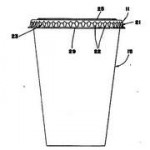 When a company deceives the consuming public, or exercises anti-competitive business practices in order to gain market share, we usually punish them. This is why a Washington attorney, in March of 2007, sued Solo Cup, and then Gillette, for claiming their products were protected by patents when in fact they were not. The story of Matthew Pequignot is not new. He found an archived legal hole that allows any citizen to sue on behalf of the government if they can prove that a company is guilty of “false markings” - or stamping a product with a patent number when that patent is long expired. Pequignot discovered that a number of companies had been taking advantage of such “scare tactics”, and through the legal hole, sued on behalf of the government using the “false markings” rule, the first individual to do so. The payoff is healthy - with damages calculated similar to copyright law - up to $500 per violation.
When a company deceives the consuming public, or exercises anti-competitive business practices in order to gain market share, we usually punish them. This is why a Washington attorney, in March of 2007, sued Solo Cup, and then Gillette, for claiming their products were protected by patents when in fact they were not. The story of Matthew Pequignot is not new. He found an archived legal hole that allows any citizen to sue on behalf of the government if they can prove that a company is guilty of “false markings” - or stamping a product with a patent number when that patent is long expired. Pequignot discovered that a number of companies had been taking advantage of such “scare tactics”, and through the legal hole, sued on behalf of the government using the “false markings” rule, the first individual to do so. The payoff is healthy - with damages calculated similar to copyright law - up to $500 per violation.
In March, a U.S. District Judge concluded that the law was constitutional (to let an individual sue on behalf of the government), and in May the Justice Department intervened on behalf of another individual trying to follow in Pequignot’s footsteps. So, if federal judges and the government believes the law is constitutional, and that such a case is worthy to pursue, then why does every person I speak to, and every article I read, denounce the cases as “frivolous” and deem the attorneys suing on behalf of the government in such cases as “looking to collect an easy payoff”. For an example, read this article from the Courier Journal.
I’d like not to touch on any personal dilemmas attorneys may have in pursuing a certain case, but instead on the legitimate and necessary function that laws fighting anti-competitive practices serve . . . especially with regard to intellectual property. It is the inherent characteristic of intellectual property law that it may be easily abused. In effect, it hands a monopoly to IP owners, and therefore IP law and antitrust law butt heads often. After all, one protects competition, while the other protects a single competitor. For this reason, laws similar to the one Pequignot triggered are important in balancing this clash and leveling the potential abuses that may occur when monopolies are exercised. It is important to note that the U.S. intellectual property law system, its reputation and continuance, depends on laws that curtail its abuse . . . much like the “false markings” rule.
Thoughts?
 Ian McClure is a former corporate & securities and intellectual property law attorney with
Ian McClure is a former corporate & securities and intellectual property law attorney with  Trevor M. Blum is a former Associate in the Chicago-based, valuation practice group of Ocean Tomo, LLC., an intellectual property (IP) consultancy. Additionally, he provided instrumental research support to Intellectual Property Exchange International, Inc., an IP exchange start-up. Trevor holds a B.S. from Indiana University and is currently an MBA candidate at the University of Cambridge, focusing on international business and finance. His interests also include entrepreneurship, economics, and informational visualization. He enjoys running and cycling in his free time. Trevor seeks to bring a transnational business perspective to the blog.
Trevor M. Blum is a former Associate in the Chicago-based, valuation practice group of Ocean Tomo, LLC., an intellectual property (IP) consultancy. Additionally, he provided instrumental research support to Intellectual Property Exchange International, Inc., an IP exchange start-up. Trevor holds a B.S. from Indiana University and is currently an MBA candidate at the University of Cambridge, focusing on international business and finance. His interests also include entrepreneurship, economics, and informational visualization. He enjoys running and cycling in his free time. Trevor seeks to bring a transnational business perspective to the blog. 
No Comments, Comment or Ping
Reply to “The False Markings Cases: Frivolous or Fighting Fraud?”